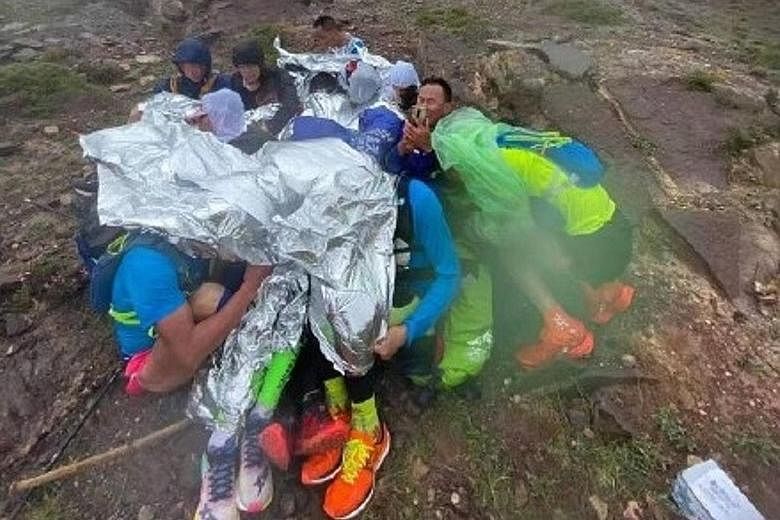NEW YORK • The national sports authorities in China have suspended all ultramarathon and long-distance races after 21 runners participating in an event in Yellow River Stone Forest park in Gansu province in north-western China were later found dead.
The ultramarathon held on May 22 has been called one of the most tragic events in the history of long-distance running and provincial officials have opened an investigation into what went wrong. Now, some family members of those who died are quietly asking if officials squandered precious hours before trying to save lives.
In the announcement suspending ultramarathons on Wednesday, the government said the casualties in Gansu had "taught the country a grave lesson".
Dozens of the 172 elite runners had gone missing, blinded by wind and hailstones, and lacking proper gear for the bitter cold that had descended on them. Still, officials did not cancel the race until another hour had passed, at 2pm. The local officials who organised the race have provided few details about what happened and have yet to publish a list of the dead.
Experts suggested that critical time was lost before an adequate rescue effort began, and they questioned the organisers' decision to remove light jackets and long underwear from a list of mandatory gear. In previous years, the extra layers were not needed because of unusually warm weather, but some say that was no excuse.
It was not until 7pm that the local authorities sent 1,200 people to look for 33 runners who were missing, according to Xinhua. Only 12 of those 33 missing runners were found alive.
China's central government and its state-owned media have suggested that local officials put profits over safety.
Many of the survivors and most of the relatives reached by The New York Times declined to be interviewed, citing concerns that they might be under surveillance by the local authorities.
Mr Huang Yinbin, 28, was one of the runners who died. His heartbeat stopped at 2.02pm, two minutes after the race was officially called off, according to his sister, Ms Huang Yinzhen. When she travelled to Gansu with six other family members to collect her brother's body, she said, she was followed by local officials, who worked to keep the victims' families from speaking to each other.
"They just prevent us from contacting other family members or reporters, so they keep monitoring us," Ms Huang said.
She said officials had offered her family 950,000 yuan (S$196,920) as a settlement, which they refused because they still want answers. The public affairs office for the city of Baiyin, which hosted the race, did not respond to multiple requests for comment.
The city's mayor, Mr Zhang Xuchen, has apologised, but said rescuers responded as quickly as they could, given the extreme weather conditions.
China's marathon industry has ballooned in popularity in recent years. Organisers see the races as opportunities to draw tourists to some of the country's poorest regions, like Gansu.
But the deaths have ignited debate over whether the sport has become too risky, particularly in remote areas where rescue missions can be difficult.
China's top leader Xi Jinping, has called for a close examination of the industry.
NYTIMES

